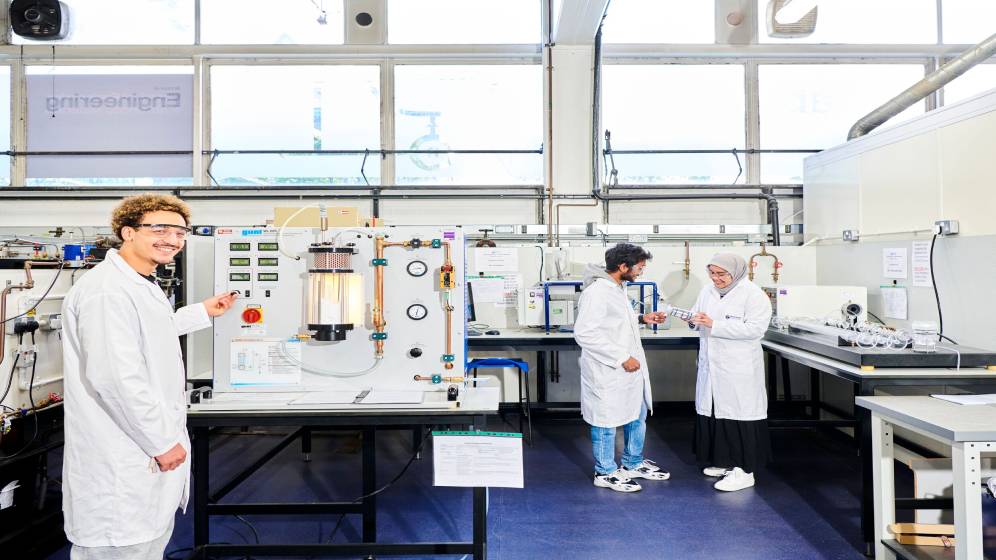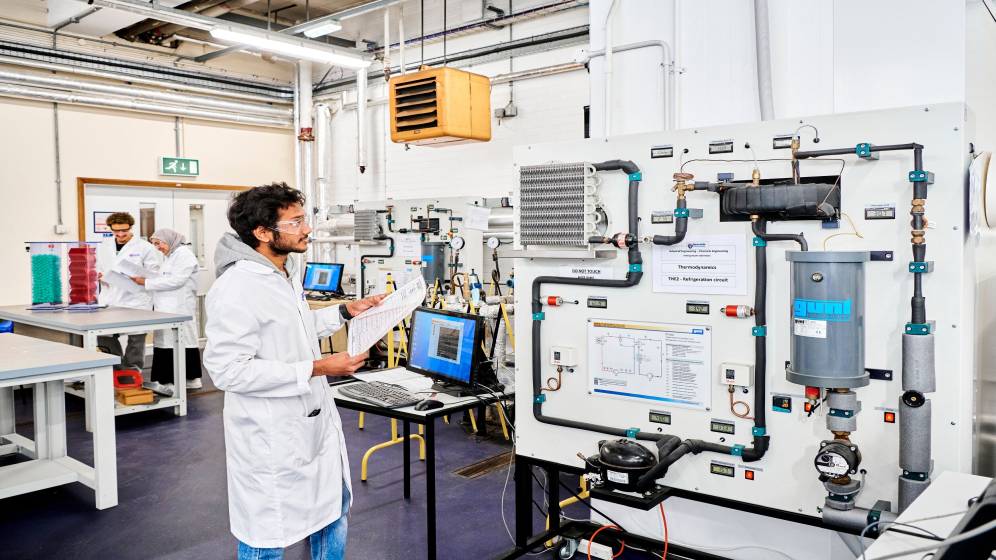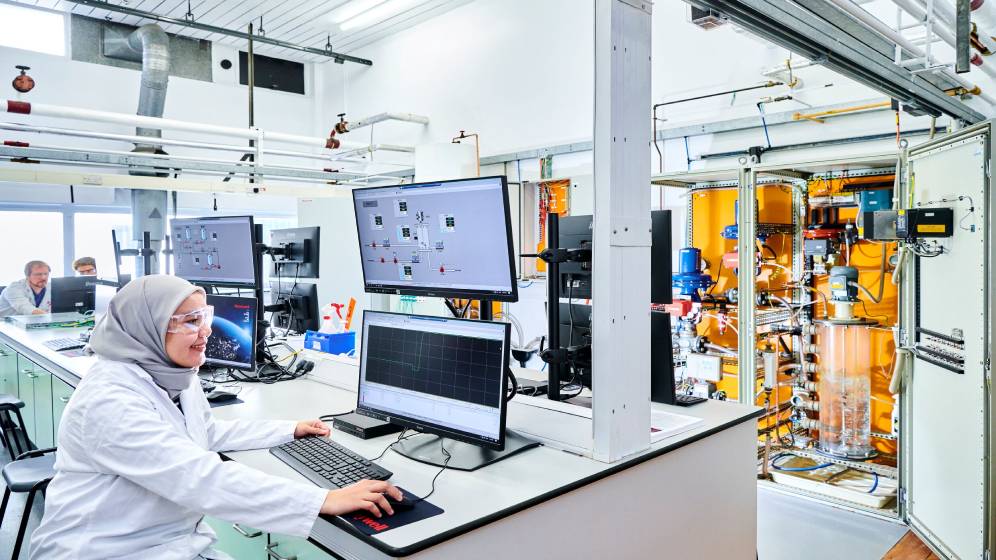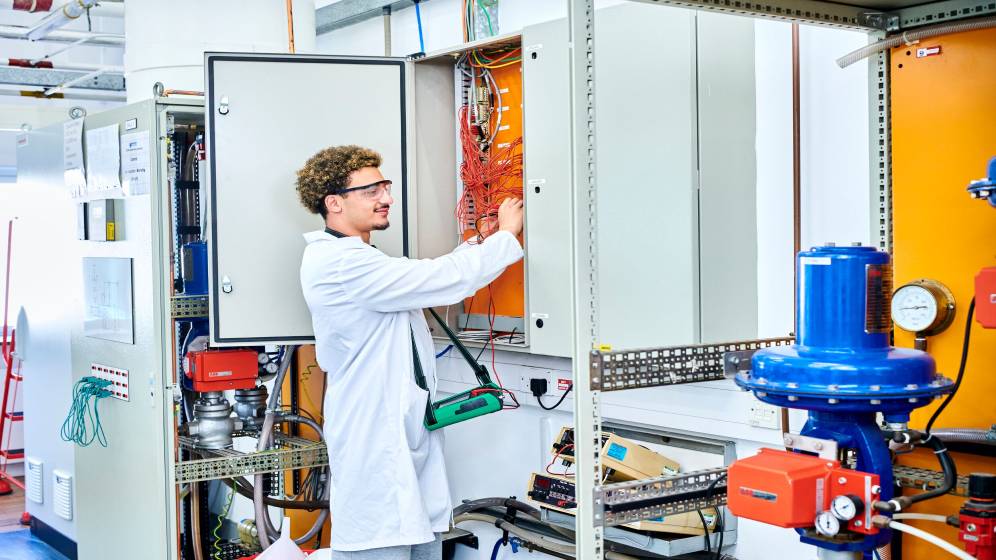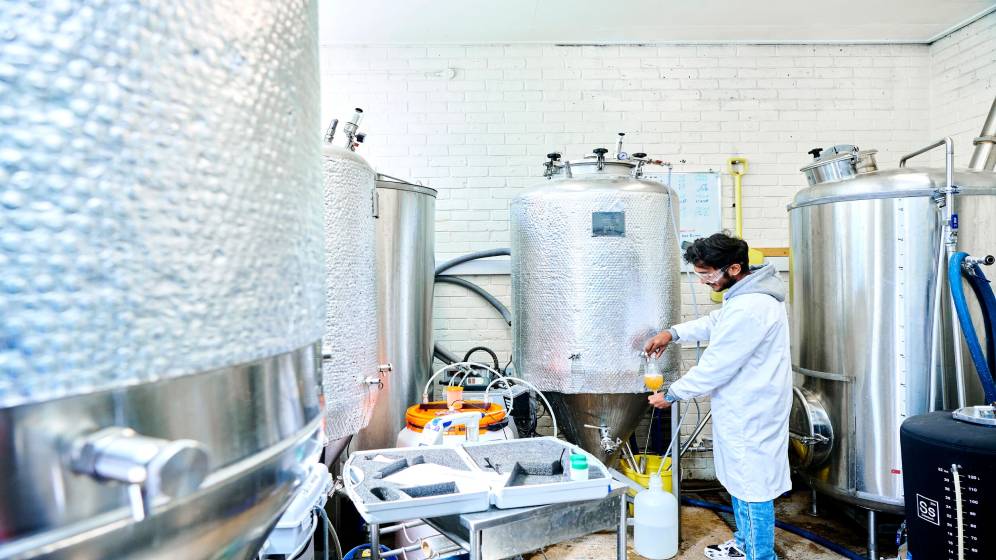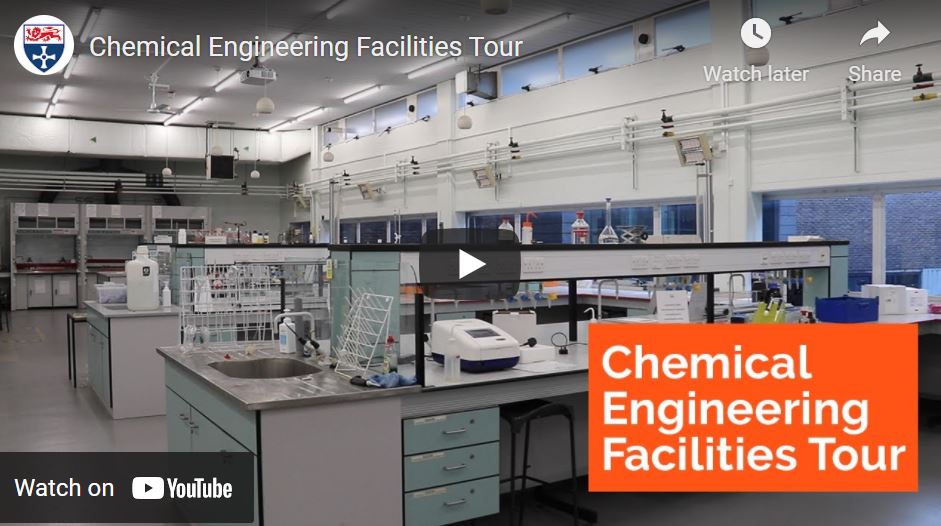Chemical Engineering BEng Honours
- UCAS code: H810
- Full time
- 3 years
This double-accredited Chemical Engineering degree equips you with the skills and knowledge to become a professional engineer. You'll graduate ready to tackle global challenges in industries like oil, gas, energy, pharmaceuticals, and consumer products.
You are currently viewing course information for entry year: 2026
Next start date:
- September 2026
UCAS Institution name and code:
- NEWC / N21
Course overview
Chemical engineers play a crucial role in many aspects of our everyday lives. This degree will equip you with the knowledge and practical skills you need to contribute to future scientific and technological breakthroughs within the diverse sector.
Practical learning and industry placements are integrated throughout the degree, giving you the opportunity to put your learning into practice, develop your professional expertise, and gain invaluable real-life experience in the sector.
You'll gain expertise across a broad range of chemical engineering topics, including thermodynamics, plant design, and process control.
BEng or MEng?
Both our BEng degree and specialist MEng degrees provide a pathway to becoming a Chartered Engineer. This is one of the most recognisable international engineering qualifications.
Our MEng degrees are a direct route to becoming a Chartered Engineer (CEng). You don’t need to study any more qualifications after your degree to work towards chartered status.
Our three-year BEng degree can also lead to Chartered Engineer status. However, you’ll need to complete further study, such as an approved master’s degree.
READ MORE
Your course and study experience - disclaimers and terms and conditions
Please rest assured we make all reasonable efforts to provide you with the programmes, services and facilities described. However, it may be necessary to make changes due to significant disruption, for example in response to Covid-19.
View our Academic experience page, which gives information about your Newcastle University study experience for the academic year 2025-26.
See our terms and conditions and student complaints information, which gives details of circumstances that may lead to changes to programmes, modules or University services.
Additional information
Flexible degree structure
All of our chemical engineering degrees share the same first three years – with the exception of our Chemical Engineering with Industry degree. We allow you to explore the subject and find out where your interests lie.
You can transfer between any of our chemical engineering degrees if you want to.
You must achieve the appropriate academic standard to transfer from a BEng to an MEng degree.
Quality and ranking
Professional accreditation and recognition
All professional accreditations are reviewed regularly by their professional body.
Modules and learning
Modules
The information below is intended to provide an example of what you will study.
Most degrees are divided into stages. Each stage lasts for one academic year, and you'll complete modules totalling 120 credits by the end of each stage.
Our teaching is informed by research. Course content may change periodically to reflect developments in the discipline, the requirements of external bodies and partners, and student feedback.
Optional module availability
Student demand for optional modules may affect availability.
Full details of the modules on offer will be published through the Programme Regulations and Specifications ahead of each academic year. This usually happens in May.
To find out more please see our terms and conditions
During Stage 1, you'll be introduced to core engineering, mathematics and science principles, including chemistry, thermodynamics, the principles of chemical engineering and engineering mathematics.
Modules
| Compulsory Modules | Credits |
|---|---|
| Thermodynamics | 10 |
| Transfer Processes | 25 |
| Computing and Numerical Methods | 10 |
| Data Analysis in Process Industries | 5 |
| Chemical Engineering Laboratory | 10 |
| Chemistry for Chemical Engineers | 20 |
| Principles of Chemical Engineering | 20 |
| Engineering Mathematics I | 20 |
The areas covered in Stage 1 will be expanded on in Stage 2, introducing disciplines such as reactor engineering, separation processes, and process measurement, dynamics and control.
Modules
In your final year, you'll work in a team to design a process plant, which will then be presented to experts from the sector. If you've decided to specialise on a specific area of chemical engineering, your project can be tailored to fit in with your chosen specialism.
Modules
| Compulsory Modules | Credits |
|---|---|
| Process Control | 10 |
| Process Design & Economics | 15 |
| Separation Processes 2 | 15 |
| Design for Process Safety | 10 |
| Reactor Systems Engineering | 15 |
| Process and Product Engineering | 10 |
| Plant Design | 40 |
| Chemical Engineering Laboratory III | 5 |
We base these figures and graphs on the most up-to-date information available to us. They are based on the modules chosen by our students in 2024-25.
Teaching time is made up of:
- scheduled learning and teaching activities. These are timetabled activities with a member of staff present.
- structured guided learning. These are activities developed by staff to support engagement with module learning. Students or groups of students undertake these activities without direct staff participation or supervision
Teaching and assessment
Teaching methods
Your teaching is case study-led, and gives a real-world relevance to your degree education.
You'll be taught through:
- lectures
- tutorials
- seminars
- computer practice sessions
- practical laboratory work
- group work on case studies and design projects
Assessment methods
You'll be assessed through a combination of:
-
Assessments
-
Case studies
-
Coursework
-
Examinations – practical or online
-
Group work
-
Practical sessions
-
Presentations
-
Reflective report/journal
-
Reports
Skills and experience
Practical skills
You'll reinforce your learning and gain hands-on experience through:
- practical sessions carried out in our well-stocked Pilot Plant and Millennium Lab, where you'll be able to carry out chemistry experiments and use real-life equipment
- work on real-world engineering projects informed by industry-leading companies
- experience with industry-standard chemical engineering software in our dedicated computer suites
- access to cutting-edge process control software and equipment in our dedicated Process Control Lab, co-designed with industry partner, Honeywell and used for professional training
Real business skills
You'll also have the opportunity to get involved in the StuBrew student enterprise - Europe's first student run microbrewery.
Research skills
During your final year, you'll have the opportunity to carry out a summer research project.
Opportunities
Study abroad
In your final year, you complete an individual design project and a substantial research project.
With the agreement of the Degree Programme Director, you can carry out a research project at one of our partner universities in Europe or worldwide. Locations include Australia and Singapore.
Work placement
Get career ready with a work placement and leave as a confident professional in your field. You can apply to spend 9 to 12 months working in any organisation in the world, and receive University support from our dedicated team to secure your dream placement. Work placements take place between stages 2 and 3.
You'll gain first-hand experience of working in the sector, putting your learning into practice and developing your professional expertise.
If you choose to take a work placement, it will extend your degree by a year, and your degree title will show you have achieved the placement year. A work placement is not available if you're spending a year studying abroad. Placements are subject to availability.
Facilities and environment
Facilities
You'll have access to a great range of facilities and equipment during your time at Newcastle, including:
- a state-of-the-art BioLab, providing access to a range of small-scale unit operations and the latest equipment
- a recently upgraded pilot plant laboratory
- modern bench-top experimental equipment
- an interactive video teaching system
- high-specification fume cupboards for handling volatile chemicals
- two dedicated computing suites, running specialised industry-standard computer software
Support
To support you in your studies, all new students entering year 1 or year 2 will receive a start-up pack containing essential personal protective equipment.
You'll be supported by a personal tutor (an academic member of staff) throughout your degree. They can help you with academic and personal issues.
You'll also have access to a peer mentor (a fellow student) in your first year. They can help you settle in and answer any questions you have.
Your future
Prepare for diverse career paths
Many of our graduates go on to work for high-profile employers within sectors such as:
- pharmaceuticals
- chemicals
- energy
- oil and gas
- environment
- biotechnology
Recent graduates have taken up roles including:
- chemical engineer
- energy marketing & trading analyst
- graduate engineer
- process engineer
- technology risk associate
Our graduates are employed by highly respected companies such as:
- Nestle
- Nissan
- Mott MacDonald
- British Steel
- Proctor & Gamble
- Reckitt Benckiser Group
- Amec Foster Wheeler
Industry links
We're proud of our strong industry links, which will create a wealth of opportunities for networking, placements, and development during your studies. Consultants from industry deliver classes on current industrial practice, providing the latest insight into issues such as safety and sustainability.
Engineers from the British Chemical Engineering Contractors Association (BCECA) deliver sessions on chemical plant design that reflects current industrial practice. These engineers are from:
- ABB
- Air Products
- Aker Solutions
- Bechtel
- Costain
- Fluor
- Honeywell UOP
- Johnson Matthey
- KBR
- McDermott
- SABIC
- Wood Group
- Worley Parsons
Make a difference
Sorry, you need JavaScript to view this video
Careers support
Our Careers Service is one of the largest and best in the country, and we have strong links with employers. We provide an extensive range of opportunities to all students through our ncl+ initiative.
Visit our Careers Service website
Recognition of professional qualifications outside of the UK
If you’re studying an accredited degree and thinking about working in Europe after you graduate, the best place to find current information is the UK Government’s guidance on recognition of UK professional qualifications in EU member states. This official resource explains whether your profession is regulated in another country, what steps you need to take, and which organisation you should contact.
Entry requirements
All candidates are considered on an individual basis and we accept a broad range of qualifications.
The entrance requirements and offers below apply to 2026 entry.
| A-Level | |
|---|---|
| International Baccalaureate | |
|---|---|
Other UK and the Republic of Ireland qualifications
Alternative offers at Newcastle
Through one of our contextual or alternative offer routes, you could receive an offer of up to three grades lower than the typical requirements.
Contextual offers
We use certain contextual data from your UCAS form, alongside your application, to consider challenges that you may have faced in your education and the potential effect this may have had on your qualifications. This means you may be eligible to receive a lower contextual offer.
PARTNERS offers
One of the largest and longest support entry routes to university of its kind for students from underrepresented backgrounds. We support applicants from application through to study.
Realising Opportunities offers
A unique programme delivered in collaboration with 10 leading, research-intensive universities in the UK. The programme is open to students in Year 12/first year of college.
Pathways to Newcastle offers
Pathways to Newcastle, our national skills entry route, is available for specific subject areas.
High Performance Athletes
We support promising athletes at the application stage, who compete in regional, national or international levels in their sport.
Qualifications from outside the UK
English Language requirements
Entrance courses (INTO)
International Pathway courses are specialist programmes designed for international students who want to study in the UK. We provide a range of study options for international students in partnership with INTO.
These courses are specifically designed for international students who want to study in the UK and progress onto one of our undergraduate degrees. Our International Study Centre, has a range of study options including:
- International Foundation
- International Year One
- English Language courses
Find out more about International Pathway courses
Admissions policy
This policy applies to all undergraduate and postgraduate admissions at Newcastle University. It is intended to provide information about our admissions policies and procedures to applicants and potential applicants, to their advisors and family members, and to staff of the University.
University Admissions Policy and related policies and procedures
Credit transfer and Recognition of Prior Learning
Recognition of Prior Learning (RPL) can allow you to convert existing relevant university-level knowledge, skills and experience into credits towards a qualification. Find out more about the RPL policy which may apply to this course.
Tuition fees and scholarships
Tuition fees for academic year 2026-2027
The 2026 entry home fees have not yet been confirmed.
| Qualification: BEng Honours | |
|---|---|
|
Home students full time 3 years |
Tuition fees (Year 1)
Not set |
|
International students full time 3 years |
Tuition fees (Year 1)
30,700 |
Year abroad and additional costs
For programmes where you can spend a year on a work placement or studying abroad, you will receive a significant fee reduction for that year.
Some of our degrees involve additional costs which are not covered by your tuition fees.
Scholarships
Find out more about:
Open days and events
You'll have a number of opportunities to meet us throughout the year at our on-campus and virtual open days.
You'll be able to:
- explore our beautiful campus
- find out about our vibrant city
- discover what students think about studying at Newcastle
You'll also have the opportunity to speak to academic staff and find out more about the subjects you're interested in.
Find out about how you can visit Newcastle in person and virtually.
We regularly travel overseas to meet with students interested in studying at Newcastle University. Visit our events calendar to find out when we're visiting your region.
How to apply
Apply through UCAS
To apply for undergraduate study at Newcastle University, you must use the online application system managed by the Universities and Colleges Admissions Service (UCAS). All UK schools and colleges, and a small number of EU and international establishments, are registered with UCAS. You will need:
- the UCAS name and institution codes for Newcastle University (NEWC/N21)
- the UCAS code for the course you want to apply for
- the UCAS 'buzzword' for your school or college
If you are applying independently, or are applying from a school or college which is not registered to manage applications, you will still use the Apply system. You will not need a buzzword.
Apply through UCASApply through an agent
International students often apply to us through an agent. Have a look at our recommended agents and get in touch with them.
Get in touch
By phone
Call us on +44 (0) 191 208 3333 and press option 1. Our opening hours are Monday to Friday 10am until 4pm.
Live chat
Our NCL chatbot might be able to give you an answer straight away. If not, it’ll direct you to someone who can help.
You'll find our NCL chatbot in the bottom right of this page.
Online
Chat to our students
Choosing a university is a big decision. If you've got questions about a particular course, student life or the city of Newcastle, why not chat to our friendly students or graduates!
Keep updated
We regularly send email updates and extra information about the University.
Receive regular updates by email







